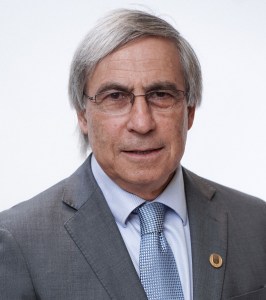Editorial
IUPAC at its Second Century – Challenges and Opportunities

“A pessimist sees the difficulty in every opportunity; an optimist sees the opportunity in every difficulty.”
– Winston Churchill
The main reason for establishing IUPAC and its most celebrated achievement during its first century was developing the common language, symbols, and terminology of chemistry. As we move to the increasingly digital age and e-Science, it is not difficult to predict that the Union will focus on all chemical aspects of artificial intelligence (AI), machine learning (ML), and big data during its second century. Essential data banks will include kinetic and thermodynamic data, raw experimental and spectral data, structural information, etc. The recent IUPAC World Chemistry Congress highlighted these issues through excellent lectures and panel discussions. I see IUPAC having a pivotal role in defining the standards around the data and metadata for such databases and the methods for evaluating the data. Expectedly, to achieve these goals, we’ll have to consolidate substantial effort and resources and develop business models to secure sustainable databases. Undoubtedly, IUPAC will take a leadership position in setting the standards.
Most global challenges, including climate changes, food for everybody, the race for sustainable energy, water quality, dwindling raw materials, and health problems, are chemical problems by nature. Therefore, without the chemical sciences and global cooperation, humankind cannot meet these challenges. Chemists have always been doing much better than politicians in solving complex problems, working together across borders and disciplines despite different political systems and cultural diversity. IUPAC can and should take a global leadership position to help meet the global challenges.
Another significant opportunity for IUPAC is the expansion of its international basis. Thanks to my previous service on the EuChemS Executive Board, the FACS Executive Committee, and the IUPAC Bureau, I have realized how important this goal is. My 13-year service as President of the Israel Chemical Society and Pro-Vice-Chancellor at the Technion campus in Guangdong, China, reinforced this understanding. IUPAC should invest much effort in adding less represented countries, mainly in Latin America, Africa, and Asia. Over the past several decades, IUPAC has included primarily the economically and scientifically developed nations. Although the 54 national members represent most of the world’s chemical sciences and industry, they constitute only one-quarter of its countries. IUPAC should not stay a club of the wealthy, but become more inclusive and take proactive measures to expand its membership worldwide.
Finally, the strong commitment of IUPAC to embrace and promote transparency, diversity, multi-cultural society, and equal opportunities for all, is reflected by its recently established Committee on Ethics, Diversity, Equity, and Inclusion (CEDEI). Along these lines, I propose establishing a chemical analog of the Hippocratic Oath taken by new physicians. Historically, that oath has become a document of professional ethics, which describes a medical doctor’s obligations and professional behavior to their patients and broader society. I suggest that IUPAC develops a Chemist’s Oath to be taken by all chemistry graduates worldwide. All new chemists will pledge to pursue truth and the principles of science, use their power to sustain life rather than end life (e.g., refrain from developing chemical weapons and lethal injections). They will follow the principles of CEDEI and stay committed to human society and all fellow human beings.
I look forward to serving the global chemistry community at exciting times for IUPAC.
Ehud Keinan
Professor of Chemistry, Technion – Israel Institute of Technology
IUPAC, President-elect for the 2024-2025 biennium
Focus
The carbon element in the EuChemS Periodic Table
The EuChemS Periodic Table depicting element scarcity has been updated to reflect the significance of carbon: its colour has been changed from green – in plentiful supply – to a tricolour of green, red, and dark grey.
This graphical update to the EuChemS Periodic Table, initially released in 2019, highlights the complications that carbon poses for sustainable materials and energy production.
We kindly invite you to read more about the updated version of the EuChemS Periodic Table here.
Professor Koch, congratulations!
Wolfram Koch, Executive Director of the German Chemical Society (GDCh) and member of the EuChemS Executive Board, was elected as IUPAC’s Treasurer on 6 August 2021. His term of office will start 1 January 2022 and will last four years. EuChemS would like to extend its warmest congratulations to him and wish him success in his new role at IUPAC.
EuChemS would like to make a special mention of the Executive Board members whose mandates will end on 31 December 2021: our sincerest thanks to Professor Kenneth Ruud and Professor Livia Simon Sarkadi, for your valuable contributions to the progression of Chemistry in Europe.
EuChemS Secretariat


You must be logged in to post a comment.